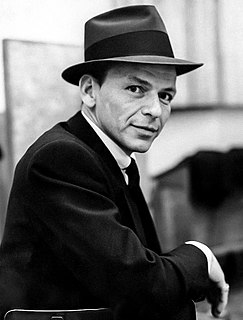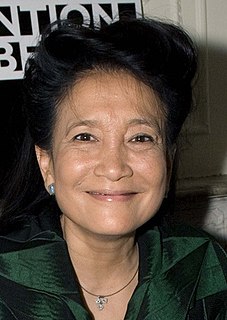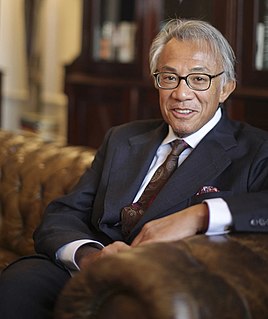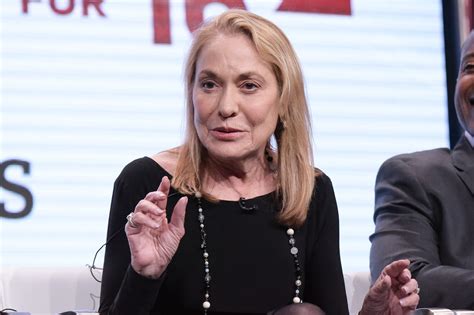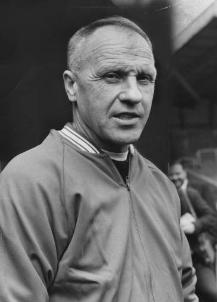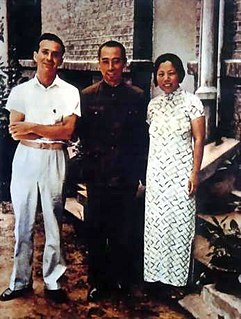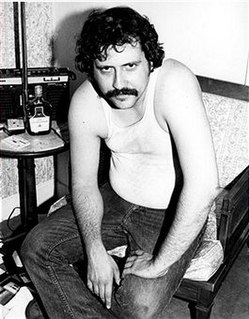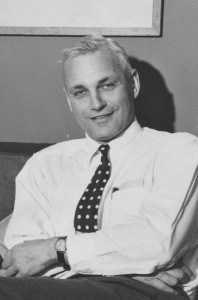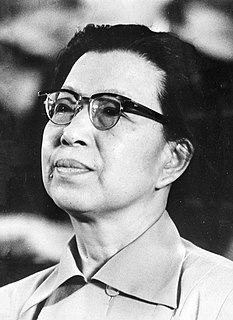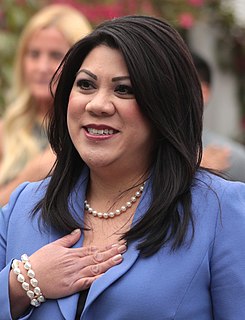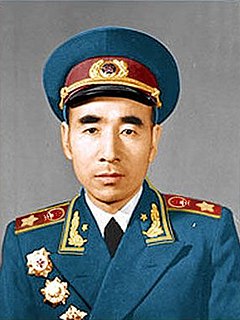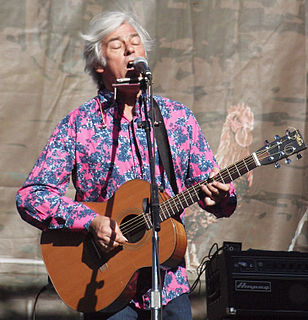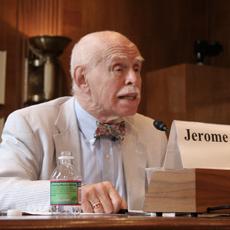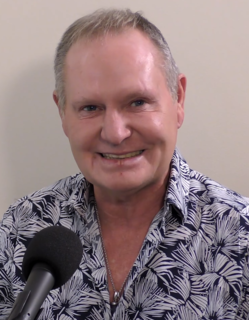Top 467 Chairman Mao Quotes & Sayings
Explore popular Chairman Mao quotes.
Last updated on April 14, 2025.
It should be pointed out that some of the things done after the arrest of the Gang of Four were inconsistent with Chairman Mao's wishes, for instance, the construction of the Chairman Mao Memorial Hall. He had proposed in the fifties that we should all be cremated when we died and that only our ashes be kept, that no remains should be preserved and no tombs built.
One Mongolian leader became a very, very brutal dictator and eventually became a murderer. Previously, he was a monk, and then he became a revolutionary. Under the influence of his new ideology, he actually killed his own teacher. Pol Pot's family background was Buddhist. Whether he himself was a Buddhist at a young age, I don't know. Even Chairman Mao's family background was Buddhist. So one day, if the Dalai Lama becomes a mass murderer, he will become the most deadly of mass murderers.
It is Chairman Mao who should be held primarily responsible for the Great Leap Forward. But it didn't take him long - just a few months - to recognize his mistake, and he did so before the rest of us and proposed corrections. And in 1962, when because of some other factors those corrections had not been fully carried out, he made a self-criticism. But the lessons were not fully drawn, and as a result the "Cultural Revolution" erupted.
Mao lived very much like the rank and file of the Red Army. After ten years of leadership of the Reds, after hundreds of confiscations of property of landlords, officials and tax collectors, he owned only his blankets, and a few personal belongings, including two cotton uniforms. Although he is a Red Army commander as well as chairman, he wore on his coat collar only two Red bars that are the insignia of the ordinary Red soldier.
So far as Chairman Mao's own hopes were concerned, he initiated the "Cultural Revolution" in order to avert the restoration of capitalism, but he had made an erroneous assessment of China's actual situation. In the first place, the targets of the revolution were wrongly defined, which led to the effort to ferret out "capitalist roaders in power in the Party". Blows were dealt at leading cadres at all levels who had made contributions to the revolution and had practical experience, including Comrade Liu Shaoqi.
It's funny that Chairman Mao's great hero was Napoleon, because Napoleon started out as a revolutionary for the underdogs and then made himself an emperor. In fact, a lot of revolutionary leaders do that, and you think, "Well, that's spoiling your argument. What are you doing?" But on the other hand, the people themselves are enjoying trying out all these different ways to be. I hope that, like the Japanese, the Chinese hang on to their own traditions as well as try out Western ones. I hate it when people just lose so much confidence in who they are that they abandon their own culture.
Chairman Mao once said that political power comes from the barrel of a gun. He was only partly right: power that comes from the barrel of a gun can be effective only for a short time. In the end, peoples love for truth, justice, freedom, and democracy will triumph. No matter what governments do, the human spirit will always prevail.
We must make a clear distinction between the nature of Chairman Mao's mistakes and the crimes of Lin Biao and the Gang of Four. For most of his life, Chairman Mao did very good things. Many times he saved the Party and the state from crisis. Without him the Chinese people would, at the very least, have spent much more time groping in the dark.
Not only did Mao Zedong Thought lead us to victory in the revolution in the past; it is - and will continue to be - a treasured possession of the Chinese Communist Party and of our country. That is why we will forever keep Chairman Mao's portrait on Tiananmen Gate as a symbol of our country, and we will always remember him as a founder of our Party and state. Moreover, we will adhere to Mao Zedong Thought. We will not do to Chairman Mao what Khrushchev did to Stalin.
Chairman Mao creatively applied Marxism-Leninism to every aspect of the Chinese revolution, and he had creative views on philosophy, political science, military science, literature and art, and so on. Unfortunately, in the evening of his life, particularly during the "Cultural Revolution", he made mistakes - and they were not minor ones - which brought many misfortunes upon our Party, our state and our people.
When he served in China during World War II, [Ho Chi Minh] learned about Mao Zedong's tactics of guerrilla war against the Japanese (and later against Chiang Kai-shek's forces), and he translated some of Mao's works into Vietnamese. But it is clear that his own ideas on how to counter the enemy ran along the same lines.
Political prodigies are rare in a nation that grooms top leaders through decades of Communist Party road-testing and pageantry. And because Chairman Mao's cult of personality led the country into extremism, the Party spent the next three decades engineering its politicians to be as indistinguishable as possible.
And lastly, Chairman Khrushchev has compared the United States to a worn-out runner living on its past performance, and stated that the Soviet Union would out-produce the United States by 1970. Without wishing to trade hyperbole with the Chairman, I do suggest that he reminds me of the tiger hunter who has picked a place on the wall to hang the tiger's skin long before he his caught the tiger. This tiger has other ideas.
The influence of the Gang of Four should not be underrated, but it should be noted that 97 or 98 per cent of the population hate them intensely for their crimes. This was shown by the mass movement against the Gang of Four which erupted at Tiananmen Square on April 5, 1976, when the Gang were still riding high, Chairman Mao was critically ill and Premier Zhou had passed away.
Mao Zedong Thought was not created by Comrade Mao alone - other revolutionaries of the older generation played a part in forming and developing it - but primarily it embodies Comrade Mao's thinking. Nevertheless, victory made him less prudent, so that in his later years some unsound features and unsound ideas, chiefly "Left" ones, began to emerge. In quite a number of instances he went counter to his own ideas, counter to the fine and correct propositions he had previously put forward, and counter to the style of work he himself had advocated.
Chairman Mao was after all a principal founder of the Chinese Communist Party and the People's Republic of China. In evaluating his merits and mistakes, we hold that his mistakes were only secondary. What he did for the Chinese people can never be erased. In our hearts we Chinese will always cherish him as a founder of our Party and our state.
While certain coastal cities have become very prosperous, the rest of China has a per capita income of $200 a year. The coast wants to have nothing to do with the interior; it wants to work with Tokyo and New York. This is an old story in China. It is why Mao succeeded in 1927. He wanted [coastal] Shanghai to throw the foreigners out, but Shanghai was doing too well financially [to expel foreigners]. So Mao went to the interior and raised a peasant army. He came back to Shanghai and sealed off the country.
As a Chinese American legislator, I applaud the RNC's Growth and Opportunity Project. Engaging Asian American and Pacific Islander communities about Republican principles is a worthwhile effort. I thank Chairman Priebus and Co-Chairman Day for making this a priority. We need to ensure our message of growth and opportunity is being heard in all communities throughout this nation, and I am proud to be a part of this effort.
In the last couple of years before Chairman Mao's death he said that the "Cultural Revolution" had been wrong on two counts: one was "overthrowing all", and the other was waging a "full-scale civil war". These two counts alone show that the "Cultural Revolution" cannot be called correct. Chairman Mao's mistake was a political mistake, and not a small one.
Chairman Mao's greatest contribution was that he applied the principles of Marxism-Leninism to the concrete practice of the Chinese revolution, pointing the way to victory. It should be said that before the sixties or the late fifties many of his ideas brought us victories, and the fundamental principles he advanced were quite correct.
I think that the only time we will really know what then-President Trump is going to do about the set of challenges that confront him is after he has sat down with his advisers as the commander in chief, when he's looking at the threats and the intelligence from the standpoint of being the number one decider, when he's hearing from his secretary of defense, his chairman, who was the same chairman President Obama had, Chairman Joe Dunford, who is an outstanding public servant, who has led our anti-ISIL effort, on which we're making great progress.
I don't advocate Stalinist monolithic state structures any more than I advocate capitalistic monoliths. Unfortunately, human society tends to the monolithic, whether you go to the left or right, everybody in leathers, or everybody holding Chairman Mao's book, and if everybody goes to one end of the pitch, I always go to the other.
First, there was Confucius. Then, the sayings of Chairman Mao. And now the pithy, ironic, and humorous insights of Ai Weiwei. I thoroughly enjoyed reading this collection, which reflects a well-developed philosophy as well as a keen understanding of the Chinese Communist system. This is China made easy and interesting.
I flunked my exam for university two times before I was accepted by what was considered my city's worst university, Hangzhou Teachers University. I was studying to be a high school English teacher. In my university, I was elected student chairman and later became chairman of the city's Students Federation.
Whatever the price of the Chinese Revolution, it has obviously succeeded not only in producing more efficient and dedicated administration, but also in fostering high morale and community of purpose. The social experiment in China under Chairman Mao's leadership is one of the most important and successful in human history.
